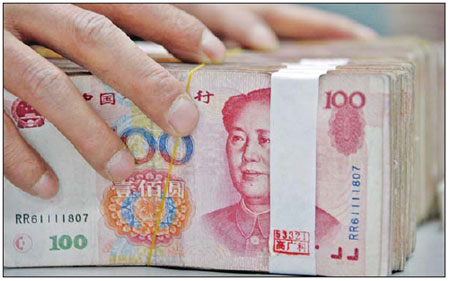Domestic liquidity remains tight
 0 Comment(s)
0 Comment(s) Print
Print E-mail
Xinhua, September 22, 2011
E-mail
Xinhua, September 22, 2011
 |
|
According to a report by the Industrial Securities Co., Ltd., the amount of capital that can be released into banks from matured bills and repurchase agreements will decline in the coming months. [Photo/China Daily] |
The People's Bank of China (PBOC), the country's central bank, injected more cash into the banking system through its open market operations on Thursday, but liquidity remains tight among Chinese banks.
Completing its open market operations this week, the PBOC auctioned only 1 billion yuan (156.7 million U.S. dollars) of three-month bills at a yield of 3.1618 percent on Thursday.
Hedging against 80 billion yuan in matured seven-day repurchase agreements, the PBOC released 48 billion yuan into the money market this week through open market operations on Tuesday and Thursday.
Even though the central bank pumped a total of 399 billion yuan of cash into banks through its open market operations in the past 10 weeks, banks' liquidity remained tight, as suggested by the rising Shanghai Interbank Offered Rate (SHIBOR).
According to a report by the Industrial Securities Co., Ltd., the amount of capital that can be released into banks from matured bills and repurchase agreements will decline in the coming months -- 451 billion yuan in September, 377 billion yuan in October, 155 billion yuan in November and 22 billion yuan in December.
In contrast to the tight money conditions among domestic banks, more liquidity from overseas is entering China seeking arbitrage from the discrepancies of interest rates.
Currently, the overnight SHIBOR moved up 14 basis points to 3.5042 percent, compared with 0-0.25 percent of the U.S. Federal Funds rate, a rate banks charge each other for loans in the United States.
According to the PBOC data, the yuan-denominated funds outstanding for foreign exchanges surged 72 percent month-on-month to a five-month high of 376.94 billion yuan in August, adding to China's pressure to stop the inflow of speculative capital, or "hot money."
Cao Fengqi, director of the Finance and Securities Research Center with Peking University, said the U.S. Federal Reserve's move to maintain its ultra-low interest rate will consolidate the interest rate difference between China and the United States.
"This will encourage the continuous inflow of hot money into China and add to policymakers' difficulty in controlling liquidity," Cao said.






Go to Forum >>0 Comment(s)